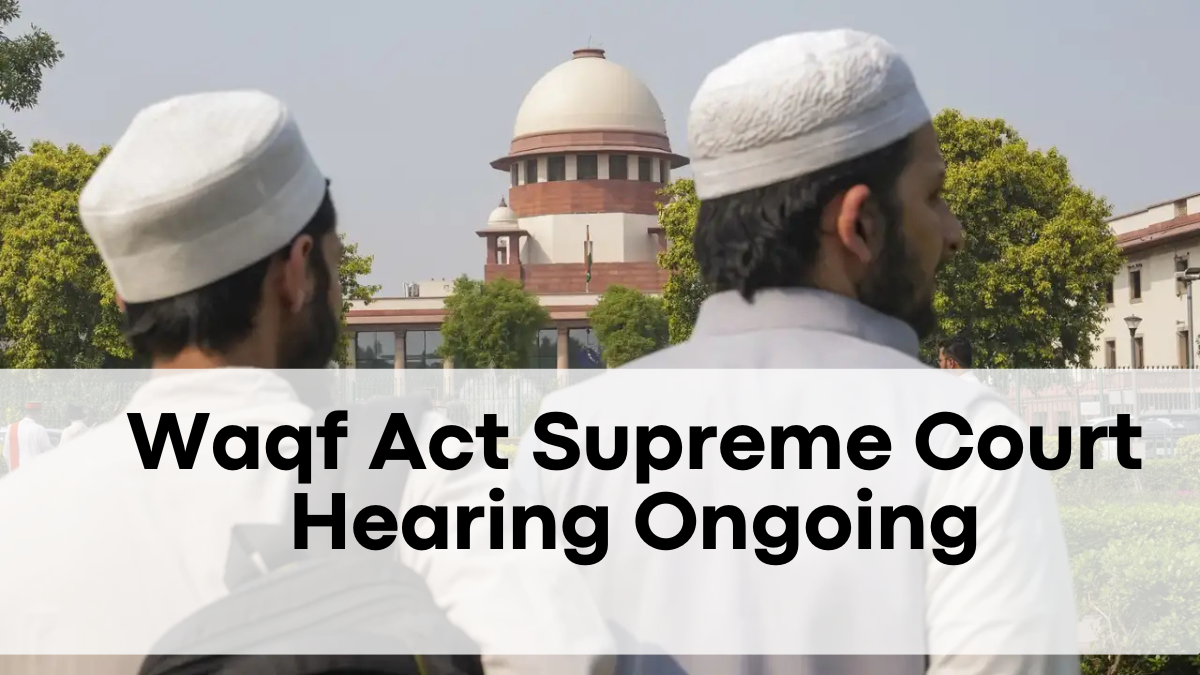The Supreme Court of India has resumed hearing a series of petitions challenging the constitutional validity of the Waqf (Amendment) Act, 2025. The case has drawn national attention due to its sensitive implications for religious rights, minority representation, and land ownership.

Waqf Act Supreme Court Hearing Ongoing
| Key Details | Description |
|---|---|
| Hearing Date | Ongoing, resumed today |
| Law in Question | Waqf (Amendment) Act, 2025 |
| Bench | Led by Chief Justice Sanjiv Khanna |
| Main Concerns | Derecognition of waqf-by-user, non-Muslim inclusion in waqf boards, land status powers |
| Government Stand | Claims law promotes transparency and accountability |
| Petitioners’ Argument | Waqfs are part of Islamic practice and deserve constitutional protection |
| Rajya Sabha Vote | Passed 128–95 |
| Lok Sabha Vote | Passed with a margin of 56 votes |
| Date of Presidential Assent | April 5, 2025 |
| Official Notification | View Notification |
Background and Legislative Changes
What is the Waqf (Amendment) Act, 2025?
The Act introduces significant changes to the original Waqf Act, which governs the creation and management of waqf properties — typically assets donated for religious or charitable purposes under Islamic law.
Key Amendments Include:
-
Derecognition of waqf-by-user properties: Properties historically used for waqf purposes without formal registration may now lose protection.
-
Non-Muslim representation: The amended Act allows inclusion of non-Muslims in the waqf administrative bodies.
-
State powers over land status: The government is now empowered to unilaterally change the status of disputed waqf properties.
Supreme Court’s Interim Observations
During the last session, the Supreme Court hinted at an interim solution to maintain balance until a final verdict is reached.
Main Points from the Bench:
-
CJI Sanjiv Khanna’s concerns:
-
Described the removal of waqf-by-user protections as potentially leading to a “huge problem”.
-
Referred to recent communal tensions in West Bengal as “very disturbing”, linking them to the law’s fallout.
-
-
Proposed interim order:
-
A three-point plan to balance stakeholder interests is under consideration.
-
Petitions and Arguments
Petitioners’ Position:
-
Assert that waqf is a religious practice under Islam and therefore protected under Article 25 and 26 of the Constitution.
-
View the amendments as an infringement on religious autonomy and minority rights.
Government’s Defense:
-
Argues the changes are designed to curb misuse and mismanagement.
-
Positions the Act as a step toward modernizing and improving accountability in waqf property administration.
Political Backdrop
-
The Act was passed amid considerable opposition.
-
In the Lok Sabha: It was cleared with a comfortable margin of 56 votes.
-
In the Rajya Sabha: The passage was narrower, with 128 in favor and 95 against.
-
Despite the debate, the Act was signed into law by President Droupadi Murmu on April 5, 2025.
Frequently Asked Questions (FAQs)
Q1: What is a waqf?
A waqf is a permanent charitable endowment under Islamic law, typically involving property dedicated for religious or social purposes.
Q2: What is “waqf-by-user”?
This refers to properties that, though not officially recorded, have been traditionally used as waqf through long-standing public recognition or usage.
Q3: Why is the inclusion of non-Muslims in waqf boards controversial?
Critics argue it interferes with the religious and cultural autonomy of the Muslim community, while supporters claim it promotes inclusivity and oversight.
Q4: What are the concerns about land status powers?
The Act gives the state power to change or challenge the status of waqf properties without judicial review, raising fears of arbitrary land acquisition.
Q5: Is the law already in effect?
Yes, it came into force after receiving presidential assent on April 5, 2025.
Click here to learn more